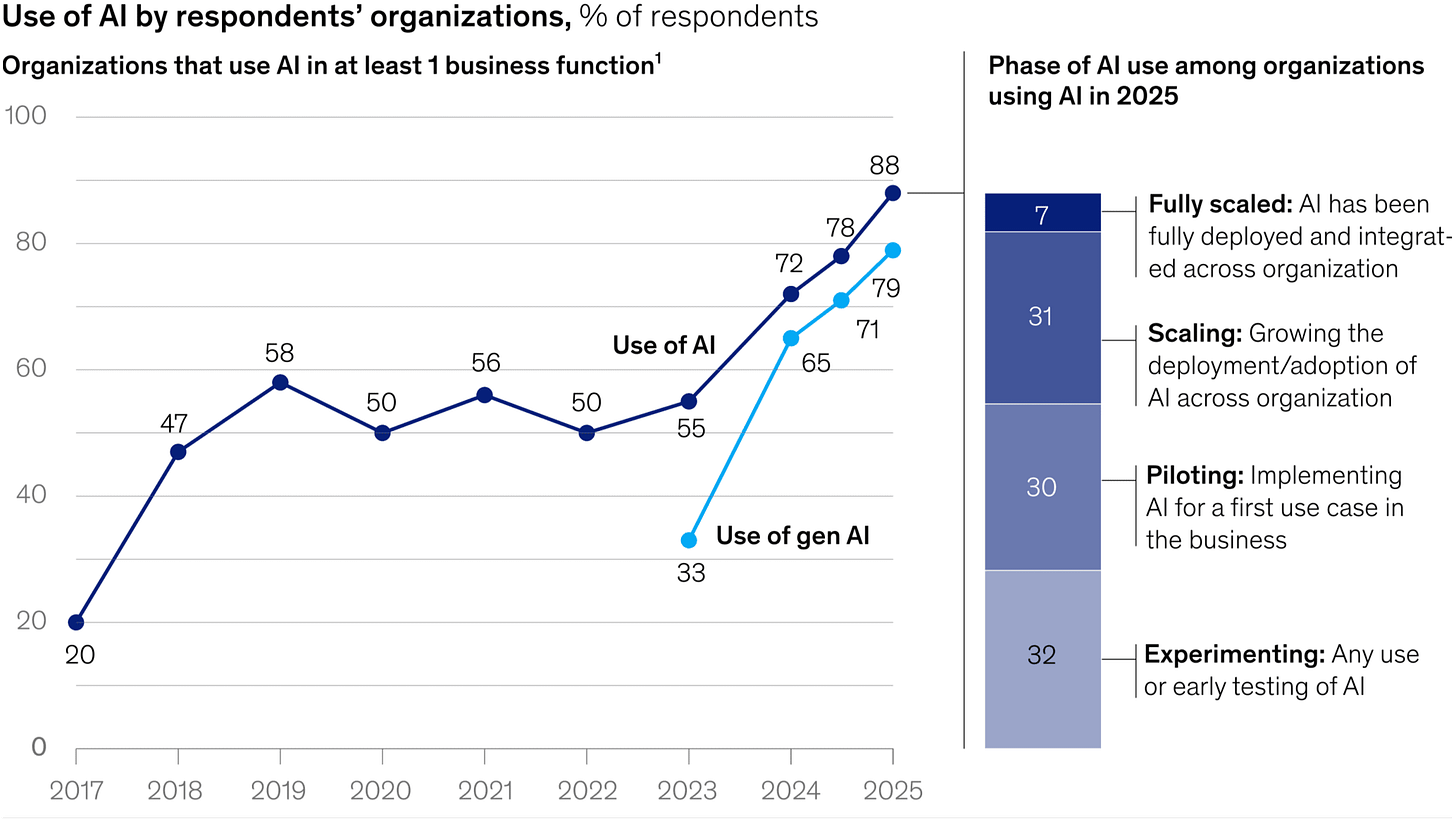🎉 Celebrity Voices, Meta Scientist to Depart, AI Needs Space, Adobe Unifies AI, Adoption Without Impact
AI is rapidly shifting from text-based systems to richer, multimodal and spatially aware intelligence, reflected in new tools (Adobe, ElevenLabs) and a new focus into spacial (LeCun, Fei-Fei Li)
Welcome to this week’s edition of AImpulse, a five point summary of the most significant advancements in the world of Artificial Intelligence.
Here’s the pulse on this week’s top stories:
ElevenLabs launches the Iconic Voice Marketplace
ElevenLabs has debuted its Iconic Voice Marketplace, a licensed catalog of AI-generated celebrity voices built in partnership with rights holders and estates.
Marketplace launches with 28 licensed voices from actors, athletes, and historical figures.
ElevenLabs brokers deals directly with celebrities or estates, then synthesizes approved voice models.
Living talent includes Michael Caine, Liza Minnelli, Art Garfunkel, and Michael Feinstein.
Estates provided archival recordings for recreations of Maya Angelou, Babe Ruth, Alan Turing, Mark Twain, and others.
Investor Matthew McConaughey is using the tech to voice his newsletter for Spanish-speaking audiences.
Why it matters
A formal marketplace for AI voices, and eventually full likenesses, has been inevitable. With clear rights structures and estate partnerships, ElevenLabs is positioning itself as an ethical path through a rapidly evolving (and legally murky) world of cloned digital IP.
Read more: https://www.theverge.com/news/818470/elevenlabs-iconic-voice-marketplace-ai-audio
Yann LeCun reportedly preparing to leave Meta
Meta’s Chief AI Scientist and Turing Award winner Yann LeCun is planning to exit the company to launch a new startup focused on world models.
FT reports LeCun has told colleagues he’ll leave Meta in the coming months.
His new venture will center on world models trained on video and spatial data.
Comes after internal friction following Meta’s AI reorg, where LeCun began reporting to Alexandr Wang.
Meta recently cut ~600 AI roles, affecting FAIR but not Wang’s TBD Lab.
LeCun has long disagreed with the transformer-heavy direction Meta has adopted.
Why it matters
LeCun’s departure signals an ideological split between Meta’s legacy research vision and its new leadership. His startup will test whether his long-held belief, that world models, not LLMs, are the path to real intelligence, can compete with today’s dominant approaches.
Fei-Fei Li: the next AI breakthrough will be spatial intelligence
Dr. Fei-Fei Li published a new essay arguing that the next frontier for AI lies in spatial intelligence, systems that understand, reason about, and generate 3D, physics-consistent environments.
Li says LLMs lack the ability to perceive and act in physical space.
Spatial reasoning is, she argues, the core of human intelligence.
World models must create realistic 3D environments, interpret multimodal inputs, and predict how scenes evolve.
Such models could advance robotics, science, healthcare, and design.
Li’s World Labs, along with Google and Tencent, are racing to build these systems.
Why it matters
True real-world reasoning, understanding motion, physics, and cause/effect, is essential for breakthroughs in robotics and scientific discovery. Spatial AI could ultimately model everything from materials to molecules, unlocking capabilities current LLMs can’t reach.
Adobe unveils unified AI strategy at MAX 2025
At Adobe MAX 2025, the company introduced a single AI plan that unifies creative models across image, audio, and video, while rolling out conversational, agentic experiences across its major apps.
Adobe announced a unified plan providing access to its top creative AI models.
Users can generate unlimited images and videos through Dec. 1.
Firefly, Adobe Express, and Photoshop now feature conversational AI interfaces.
Adobe is integrating models from Google, OpenAI, Runway, Luma AI, and others.
Businesses are using the upgraded tools to scale content at higher volumes.
Why it matters
Adobe is reframing creativity as a collaboration between humans and AI agents. By merging generative and conversational tools into a cohesive system, Adobe is betting that the future of creation comes from pairing human imagination with machine-scale execution.
Read more: https://news.adobe.com/news/2025/10/adobe-max-2025-news
McKinsey’s State of AI 2025: companies are using AI — but not scaling it
McKinsey released its 2025 State of AI report, surveying nearly 2,000 organizations and revealing widespread AI adoption but limited enterprise-scale impact.
88% of companies use AI, but only 33% have scaled it beyond pilots.
39% report EBIT impact from AI, but only 6% saw gains above 5%.
62% are exploring AI agents; just 23% have them in production.
Agent adoption is strongest in IT and knowledge management.
32% expect workforce reductions next year; larger firms predict the most cuts.
Why it matters
The real value of AI isn’t in isolated efficiency boosts, it comes from redesigning workflows, scaling across functions, and using AI to enable entirely new forms of innovation. The few companies doing this well are pulling ahead fast, widening the competitive gap.
Read more: https://www.mckinsey.com/capabilities/quantumblack/our-insights/the-state-of-ai



